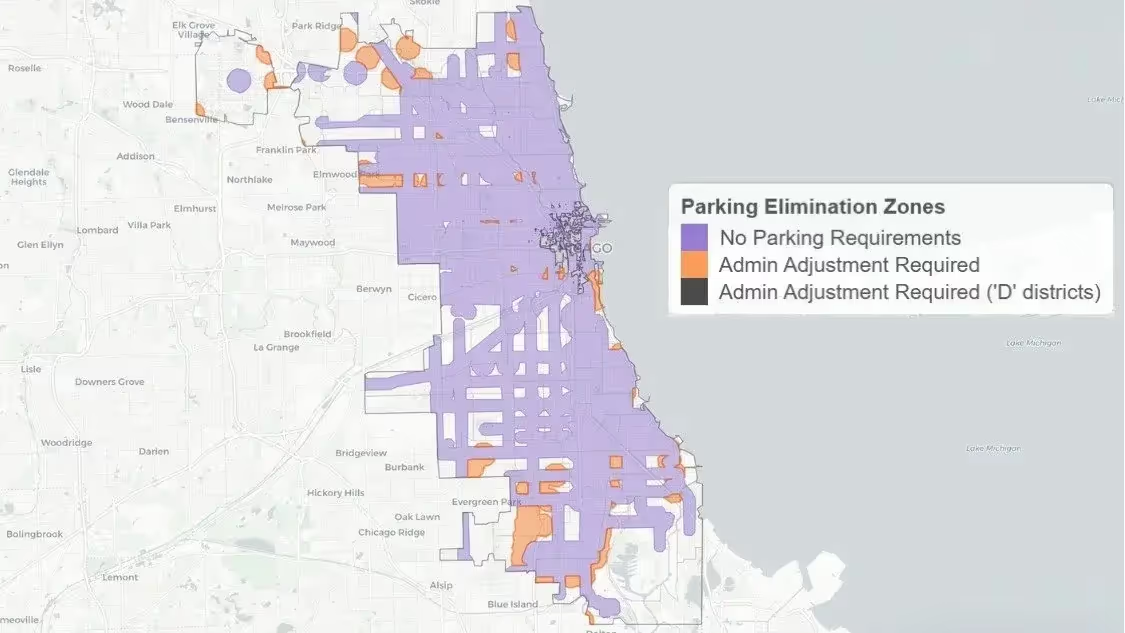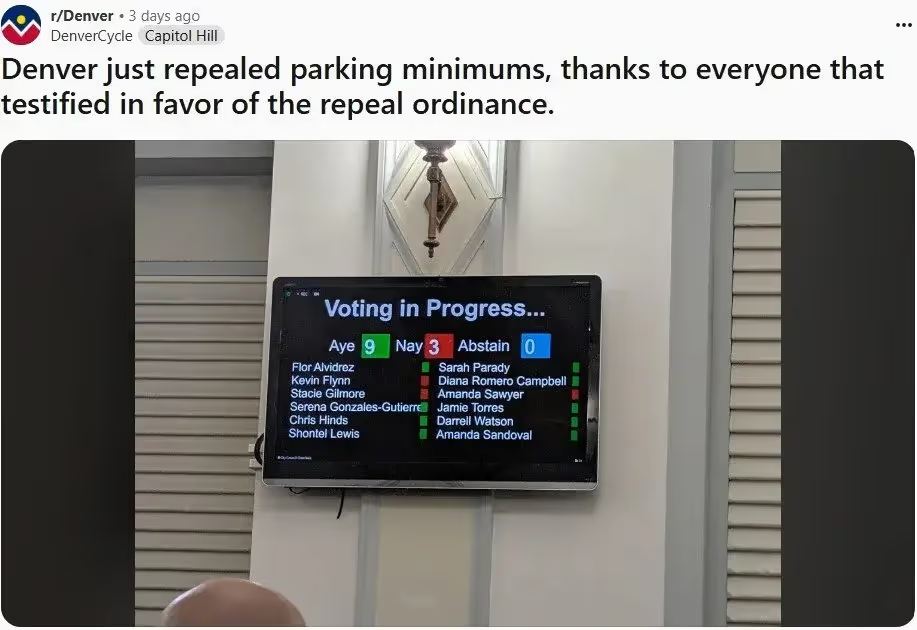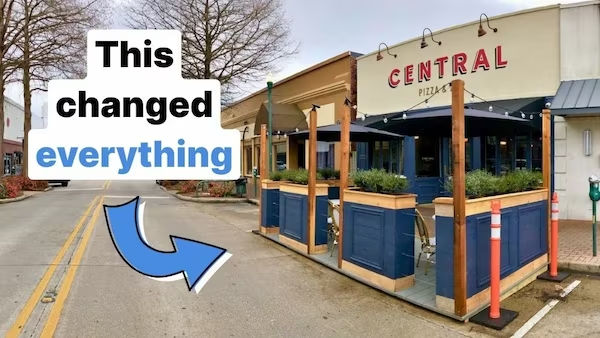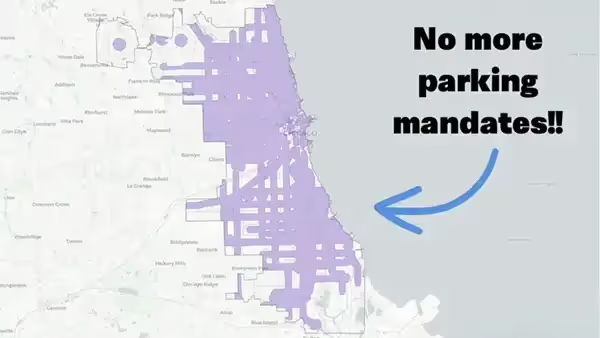On July 16, 2025, the Chicago City Council did something bold, overdue, and surprisingly straightforward: it got rid of parking mandates for most new development near public transit.
Going forward, if you want to build housing or a business near a train station or bus line, you no longer have to set aside precious–and expensive–space for cars that may never arrive. The reform, introduced by 1st Ward Alderperson Daniel La Spata, passed with broad support. When it takes effect in September, developers building near Chicago Transit Authority train stations or within a quarter mile of a bus line will no longer be required to include off-street parking.
And just last week, Denver became the latest U.S. city to take the plunge even further. Its city council voted unanimously to eliminate minimum parking requirements citywide. The policy applies to all new development, from single-family homes to large apartment buildings and commercial spaces, and follows years of public input, analysis, and shifting attitudes toward land use.
With these twin moves, Chicago and Denver join a growing list of cities including Anchorage, Minneapolis, and Austin in rethinking how city space is used, and what we pay for.
The High Cost of Mandated Parking
Until now, Chicago—like most American cities—mandated a minimum number of parking spots that were often unrelated to actual demand. Residential developments were typically required to include at least one parking space per unit and two for single-family homes. For commercial properties, the requirement was two to 2.5 spaces per 1,000 square feet.
→ Read about how parking mandates thwarted the dreams of one Dallas resident
These mandates applied across much of the city, with only limited exemptions in designated transit-oriented development zones. The newly adopted ordinance extends the option to forgo parking to an estimated three-quarters of the city.
The policy does not prohibit developers from building parking. Instead, it removes the obligation to do so, allowing market conditions and neighborhood context to determine what is built.
The move comes after years of analysis and advocacy pointing to the high financial and spatial costs of mandated parking. According to city estimates, constructing an underground parking space in Chicago averages $67,500. Above-ground garages cost between $70 and $100 per square foot, making a 500-space facility a $10–15 million investment. Those costs are almost always passed along to tenants and business owners, whether or not they own a car.

Even beyond cost, the space consumed by parking has long been at odds with housing goals. As the city noted in its “Connected Communities” planning framework, two parking spaces occupy roughly the same footprint as a studio apartment. In a city where housing affordability and density near transit are increasingly urgent concerns, mandated parking has constrained what developers can build and where.
“It makes it easier to build. It makes it more affordable to build,” La Spata told the Chicago Tribune after the vote. “It gives much more flexibility to developers to add parking in ways that are meeting the market.”

It’s worth noting that even before this vote, Chicago had been loosening its grip on parking mandates in limited ways. In designated Transit-Oriented Development (TOD) areas—generally mixed-use zones near train stations—the city had already cut parking requirements in half. That meant residential developers could provide just 0.5 spaces per unit, and commercial projects could be approved with as little as 1 to 1.25 spaces per 1,000 square feet. Some parts of downtown had even eliminated parking minimums altogether.
The July 2025 reform takes that patchwork of exceptions and turns it into a rule. Instead of reducing the minimums, it eliminates them entirely for most of the city. It gives builders and neighborhoods more flexibility to respond to real conditions on the ground—how people actually get around, rather than how they’re assumed to.
What’s Next for the Windy City?
Chicago knows it must become more housing-ready, and parking reform is an important step forward—but it’s just one piece of a much larger puzzle.
At the same City Council meeting, the mayor’s office also pushed for an ordinance to allow homeowners across the city to build “additional dwelling units” (ADUs)—things like backyard cottages or converted garages. These smaller, more affordable units can help families grow and adapt. But so far, the proposal has stalled amid concerns about changing the character of single-family neighborhoods.
“We’re on pace to build at least 10,000 units by the end of my first term,” Mayor Johnson said. “We’re going to work to expedite that.”
If the city moves forward, Chicago would join places like Bozeman, Montana; Raleigh, North Carolina; and Bangor, Maine, all of which have eased rules around adding ADUs. Those cities have seen seniors age in place, young adults return home, and families find more diverse housing options—beyond the traditional 5-bedroom house.
Denver Doubles Down—and Gets a Boost from the State
Denver’s move to scrap parking mandates citywide builds on momentum already growing across Colorado. In 2024, the state legislature passed House Bill 1304, a landmark land-use reform bill that preempted many local parking requirements. HB1304 barred cities from requiring off-street parking for new multifamily developments located within a quarter mile of transit stops and imposed caps on parking mandates for other types of housing.
That law effectively loosened the grip of parking mandates in dozens of Colorado cities, but Denver’s action goes beyond state requirements, fully eliminating minimums for all development, citywide. "Making Denver more affordable for all Denverites means breaking down barriers and making it easier to build housing in our city," Mayor Mike Johnston said. Councilmember Chris Hinds put it another way: “We have a housing crisis, not a parking crisis.”

Before this summer, parking rules in Denver varied widely by neighborhood. Most apartment projects outside downtown were required to provide at least one parking space per unit. Developers had to navigate a confusing maze of zoning maps, waiver processes, and costly engineering. Now, they won’t have to.
Now the city is one step closer to hitting its housing and transportation goals, and it’s saving time and resources for both builders and city staff in the process.
Why This Matters
For decades, parking mandates have quietly shaped the way our neighborhoods grow—often with unintended consequences. By requiring every new home or business to come with space for cars, cities have locked themselves into patterns of development that are more expensive, more spread out, and less adaptable to changing needs.
Removing those mandates doesn’t mean eliminating parking. It means making space for different approaches so that communities can respond to real demand, not outdated assumptions. It creates room for more housing options, more of the things that we actually enjoy in our neighborhoods, and more productive use of valuable land.
Chicago and Denver aren’t turning their backs on cars. They’re recognizing that no one-size-fits-all rule can account for the complexities of urban life. And they’re trusting neighborhoods to evolve—incrementally, and from the bottom up.





